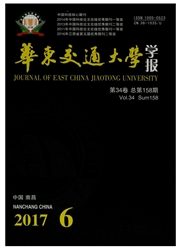

 中文摘要:
中文摘要:
交通网络中不同类型用户的路径选择行为导致混合均衡交通分配。自私用户总是选择最小实际出行成本的路径出行,利他用户选择最小理解出行成本的路径出行。最小理解出行成本是实际出行成本与边际出行成本的线性加权。首先,构建了自私用户和利他用户弹性需求混合均衡交通分配的等价变分不等式模型;然后,假定路段出行成本函数为多项式出行成本函数,并运用非线性规划方法界定了该类混合均衡交通分配的效率损失上界及其与网络参数的关系。研究结果表明,效率损失上界与网络拓扑结构无关,只和路段出行成本函数的最高次以及最小和最大利他系数相关。
 英文摘要:
英文摘要:
The mixed equilibrium traffic assignment is caused by the route choice principle of different users in transportation network. Selfish users always choose paths with minimum actual travel cost while altruistic users choose paths with minimum perceived travel cost which is a linear combination of the actual and marginal travel costs. Firstly, a variational inequality model to depict the mixed traffic assignment with selfish and altruistic users under elastic demand was developed. Secondly, the upper bound of this mixed equilibrium traffic assign- ment with polynomial cost function was derived by the nonlinear programming method and the relation between the upper bound and the network parameters was obtained. The results showed that the upper bound of efficiency loss is independent with network topology but relates to the degree of the link travel cost functions and the maximum and minimum altruism coefficient.
 同期刊论文项目
同期刊论文项目
 同项目期刊论文
同项目期刊论文
 期刊信息
期刊信息
